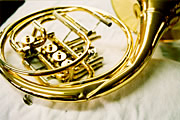Care and Maintenance of a Horn
How to take care of a horn
Not brushing your teeth will have catastrophic results!
The horn is made up of a tube the size of a ballpoint pen that gets gradually larger, and if you do not keep your mouth clean, a catastrophe is just waiting to happen. One day, you will think that something is not quite right, that it is too hard to play, so you remove the slide and blow into the mouth piece. Surprise! Some mysterious matter will come flying out. It's slime!
Because you did not brush your teeth before playing, the bits and chunks of food stuck to your teeth collected inside the horn and rotted. Playing while you eat is also an outrageous mistake. Even if you clean up before you play, the instrument requires regular maintenance. Read the owner's manual carefully, and take good care of your instrument.
How to hold the horn?
Hold the horn by the thicker outer tube, not by the center part. The center part has moveable slides, and they may bend under pressure and become non-functional.
Place the horn on a flat, wide surface
It is dangerous to leave a horn on a chair. The bell protrudes and sticks out beyond the chair, so it would be very easy for someone to accidentally run into it and knock it on the floor, denting the tubing. In that case, the only person to blame is the one who left the horn in an unstable place to begin with.
A horn should be placed in a wide, flat area that can contain its entire bulk. Whether the valves are facing upward or downward, make sure that the instrument is balanced and stable. Never ever stand a horn on its bell, like a tuba. It is very unstable in this state and will fall over.
Be kind to the removable bell
Horns with removable bells are cherished by professional musicians on the road as well as students in brass bands. However, if care is not taken, they can be seriously damaged.
The bell and bell stem are connected with a screw, but if the screw is not perfectly matched when connecting them, the threads can be bent, and the bell will not longer attach to the stem. If the bell is screwed on too tightly, it will not come off again. If this happens, it will not help to try to forcefully unscrew the bell again. Doing so risks twisting the bell stem and irreparably damaging the instrument. This kind of thing happens often, so the bell must be attached to the stem with great care. If it will not come off, do not force it, and take to a professional music store.

The twisted bell stem of a horn.
The lifespan of a brass instrument is several decades
What is the average lifespan of a brass instrument? In school brass bands, where the instruments are passed on from upper classmen to lower classmen, some instruments last more than ten years. Many of the instruments used by Austria's Vienna Philharmonic Orchestra are several decades old. The Vienna Philharmonic values tradition, and they have preserved their traditional timbre. The fact is, however, that even strong metal will wear out over time, and the levers and other places that come into contact with the hands will develop holes. When that happens, they fix it with a patch and play it with respect. The lifespan of an instrument is determined by how it is handled.
Musical Instrument Guide : Horn Contents
Origins
Structure
How to Play
How the Instrument is Made
Choosing an Instrument
Trivia
- Famous horn works
- Concertos
- Mesmerizing fifths
- What does a very long horn sound like?
- The visual effect of "bells up"
- Mozart loved a good prank
- Is that the nature of the horn?
- An instrument by day, and a drinking mug by night
- Horn players can play the Wagner tuba, despite the name
- Why are horns included in woodwind quintets?
- What do you call someone who plays a horn?
- The reason that alto horns are used in brass bands
- What is a Vienna horn?
- Garlands do not deaden sound
- What is the Knopf model?
- New instruments have just been washed
